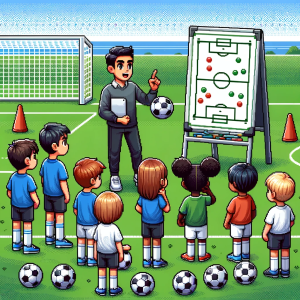
Soccer Coaching Preferences and the Path to Gender Equality
You’re a soccer club manager searching for the perfect coach to elevate your team. Credentials? Check. Experience? Top-notch. But one factor seems to overshadow all others—gender. Does it really matter whether your new coach is male or female?
For many in the soccer world, it still does. A recent study of Division 1 professional soccer players in the Eastern Mediterranean sheds light on deeply rooted attitudes toward male and female coaches. While progress has been made in leveling the playing field for women athletes, gender bias remains a significant hurdle for women in coaching roles. Understanding these preferences is key to fostering equity and creating stronger, more inclusive teams.
Let’s dive into the findings and uncover what they mean for players, coaches, and clubs striving for success.
Key Findings: Gender Matters in Coaching Preferences
The study surveyed 145 professional players (103 men and 42 women), exploring their attitudes toward hypothetical male and female coaches with identical qualifications. Here’s what emerged:
- Male Players Favor Male Coaches: Male athletes overwhelmingly preferred male coaches, often rating them higher across all metrics except for approachability.
- Female Players Prefer Female Coaches: Female athletes leaned toward female coaches, though their attitudes were more balanced and open to male coaches.
- Experience Shapes Perceptions: None of the male players had ever been coached by a woman, while 38% of the female players had worked with female coaches. This disparity likely reinforced gender biases among male players.
These attitudes mirror broader societal trends, where leadership roles are often stereotyped as “masculine.” For soccer, this means male coaches dominate despite growing numbers of qualified women entering the field.
Why It Matters: The Stakes for Soccer
This isn’t just about fairness—it’s about performance and growth. A lack of diversity in coaching can limit opportunities for innovation, mentorship, and player development. Here’s how:
- Missed Role Models: Female players benefit from seeing women in leadership positions, inspiring them to aim for similar goals.
- Diverse Perspectives: Teams thrive when coaches bring varied approaches to strategy, communication, and conflict resolution.
- Breaking Biases Early: Introducing young players to coaches of different genders can normalize inclusivity, paving the way for broader acceptance in professional leagues.
Turning Insights Into Action
How can coaches, players, and club administrators use this research to drive change? Here are practical steps to foster inclusion and improve team dynamics:
For Coaches:
- Showcase Competence Over Gender: Build trust by emphasizing your skills, certifications, and coaching philosophy.
- Foster Open Communication: Male players viewed female coaches as approachable but doubted their authority. Counter this by establishing clear boundaries and expectations.
- Educate Players: Share the benefits of diversity in coaching, including examples from successful mixed-gender coaching teams.
For Club Managers:
- Broaden Hiring Practices: Commit to interviewing a diverse pool of candidates for coaching roles.
- Support Female Coaches: Pair new female hires with mentors and resources to help them navigate challenges.
- Create Inclusive Cultures: Host workshops that address unconscious biases and promote teamwork across gender lines.
For Players:
- Challenge Biases: Reflect on your own experiences and how they shape your perceptions of coaches.
- Advocate for Exposure: Encourage clubs to introduce young teams to coaches of all genders.
- Focus on Skills, Not Stereotypes: Evaluate coaches based on their ability to help you grow, not their gender.
Lessons From Other Sports
This issue isn’t unique to soccer. Strength and conditioning studies show similar trends, with male athletes often resisting female coaches while female athletes display greater openness. However, sports like volleyball, which are perceived as less gendered, demonstrate more balanced attitudes.
The takeaway? Culture matters. By fostering a more inclusive soccer culture, we can follow the lead of sports where gender biases have already begun to erode.
Broader Implications: The Future of Soccer
The study’s findings reveal a path forward: exposure and experience. Male players, who had never been coached by women, held the strongest biases. This suggests that early interactions with female coaches could change perceptions and open doors for future generations.
For clubs and leagues, this means:
- Investing in Youth Programs: Hire diverse coaching staff for younger teams to normalize inclusivity.
- Highlighting Success Stories: Celebrate female coaches who’ve broken barriers, using their stories to inspire change.
- Tracking Progress: Regularly assess player attitudes and coaching diversity to measure the impact of these initiatives.
Your Turn to Kick It Off
What’s your experience with gender in coaching? Have you worked with or been coached by someone who broke the mold? Let us know in the comments or share your thoughts on social media.
- How would you introduce more female coaches to your club?
- What strategies have you seen work for overcoming gender biases in sports?
- How can we better prepare players to embrace diversity in coaching?
Together, we can move the ball forward on equity and inclusion in soccer.
Be Part of Soccer’s Scientific Revolution: “Discover the unseen facets of soccer with ‘This Week in Soccer’.
Our newsletter brings you closer to the game’s strategic and scientific dimensions, with content tailored for coaches, educators, and fans alike. Utilizing advanced AI tools, we make complex soccer science accessible and engaging. Don’t just watch soccer, understand it. Subscribe to our newsletter now!



